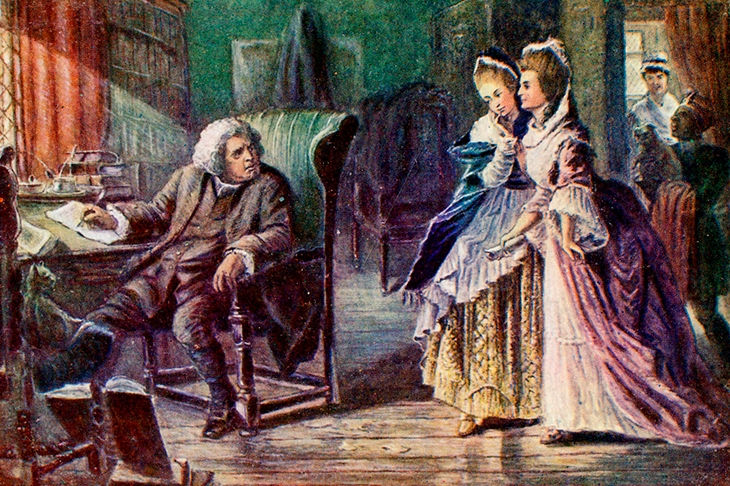To understand Boris Johnson, you have to understand the figure who has inspired him, shaped his worldview and accompanied him throughout his career. Admittedly Samuel Johnson has been dead since 1784, but his importance to Boris is unquestionable. Our next prime minister thinks the other Johnson is a ‘genius’ who ‘gave the world compassionate conservatism’. Britain, Boris once wrote, ‘has never produced an author with a better or more generous understanding of human nature’.
It’s not just that Boris admires Samuel’s essays, his poetry and the pioneering Dictionary of the English Language. The influence goes deeper than that.
When asked about offending everyone from Muslims to Scousers, Boris regretted hurting anyone’s feelings, but said the electorate was tired of politicians tiptoeing around controversial subjects. ‘I will continue to speak as directly as I can,’ he promised, ‘because that is what I think the British public want to hear.’ How did Boris come to this insight into the national character? Part of the answer can be found in a 2009 Telegraph column in which he reflected on Samuel’s legendary rudeness. (On Americans: ‘They are a race of convicts, and ought to be thankful for anything we allow them short of hanging.’) This, Boris suggested, is the source of Samuel’s enduring popularity. ‘In a nation addicted to evasion and embarrassment, we treasure people who are rude, because we assume (rather primitively) that they are more likely to tell the truth.’ It is a theory he has tested to the limit.
When invited on to Radio 4’s Great Lives, Boris nominated Samuel as his personal hero, and drew an intriguing character sketch: Samuel was a ‘fantastically competitive’ man who ‘always longed for recognition’ and liked to debate in ‘a very exuberant and hyperbolical way’. Remind you of anyone?
What motivated Samuel, Boris speculated, was an early setback: he left Oxford early and without a degree, thanks to a combination of poverty and mental illness. ‘That sense of being an academic failure, not making it, being a reject, I think haunted him,’ Boris argued. ‘And that’s one of the things that then drove him — this volcanic ambition — drove him to try and succeed.’
According to Sonia Purnell’s biography, Boris suffered ‘bitter disappointment’ at Oxford when he missed out on a First, ‘which lost him sleep then and still rankles to this day’.
Boris also sees in Samuel an exemplar of ‘compassionate conservatism’, a Tory who is on the side of the little guy. In Johnson’s Life of London (the title itself a tribute to Boswell’s biography of Samuel), Boris describes him as a free-marketeer who made ‘the classic conservative argument for the trickle-down effect’. Samuel believed, Boris points out, that the rich should splash out on luxury goods because that creates jobs. Yet Samuel was not ‘one of those 1980s yuppie monsters’, but a big-hearted man who gave abundantly to the poor and sided with the underdog. So Samuel offers a possible inspiration for the idea which Boris recently called ‘the core of my campaign’: that ‘free-market capitalism… is the way to support the poorest and the neediest in society’.
In truth, Samuel’s view of the free market was rather more complex. He backed farming subsidies, for instance, describing agriculture as ‘the great art, which every government ought to protect’. (A maxim worth remembering if we default to no deal.) Still, Boris’s portrait is not a complete caricature. Samuel was cheerfully anti–egalitarian, an advocate of monarchy and hierarchy. He was also a fervent campaigner against inhumane practices, from slavery to debtors’ prisons, and thought that ‘A decent provision for the poor is the true test of civilisation.’ He demonstrates, at the very least, that you don’t have to be a socialist to be deeply compassionate.
If Boris has been consistent about anything, it is in his distrust of grand, idealistic projects. From the Euroscepticism which made his name in the early 1990s, to his recent proposals for tax cuts, he has argued that the state should be humble and not try to reshape society. More than once, he has quoted Samuel’s rueful couplet:
How small, of all that human hearts endure,That part which laws or kings can cause or cure.
The sadness of earthly life, the Johnsons believe, cannot be solved by politicians; and those who try may do more harm than good.
But a question looms over Boris: has Brexit turned out to be a wildly idealistic project? If his negotiation strategy succeeds, he will be able to repeat Samuel’s remark on writing his dictionary, with its 40,000 carefully defined entries: ‘I knew very well what I was undertaking — and very well how to do it — and have done it very well.’
If Boris fails, he may be reminded that his hero often mocked the follies of over-ambitious leaders. ‘So, sir,’ Boswell once told Samuel accusingly, ‘you laugh at schemes of political improvement.’ ‘Why, sir,’ Samuel replied, ‘most schemes of political improvement are very laughable things.’






Comments